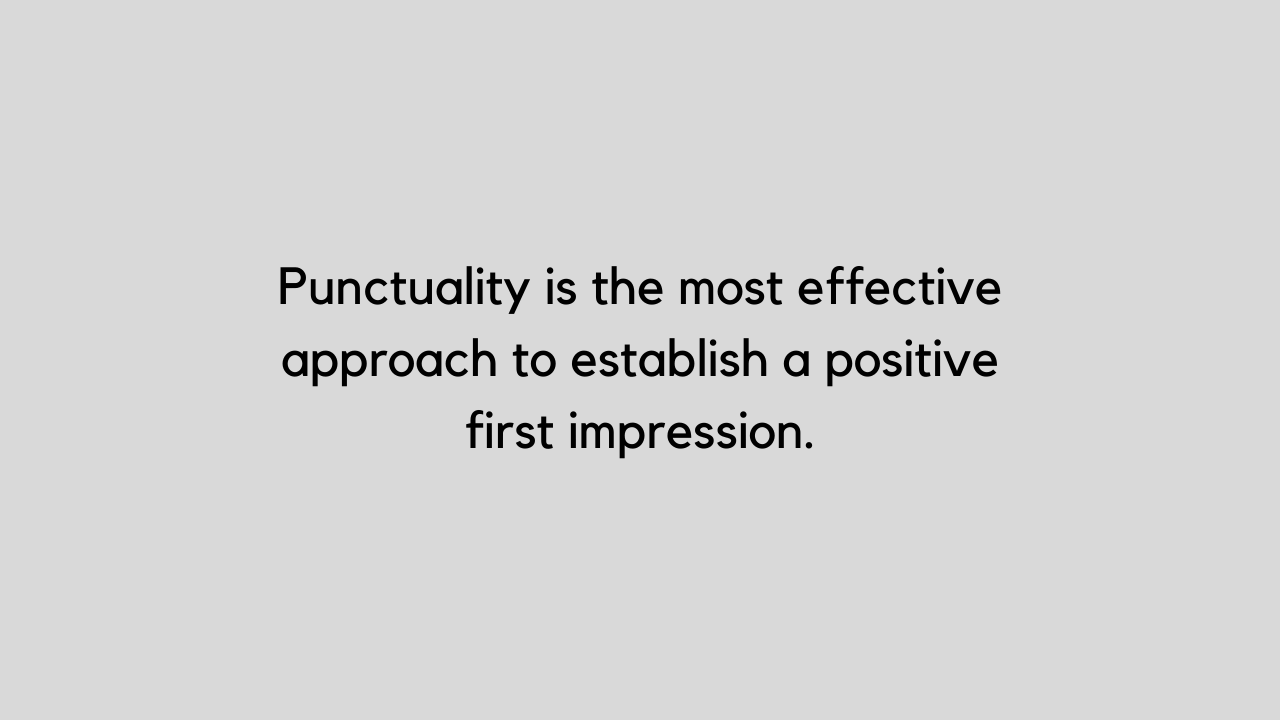Table of Content
Try Vizitor for Free!

Wed, Mar 5, 2025
Read in 9 minutes
Imagine walking into an important meeting 15 minutes late. Eyes turn, conversations pause, and you’re left scrambling to catch up. Being late is more than just an inconvenience,it affects productivity, professionalism, and trust. In fact, studies show that 81% of meetings don’t start on time, leading to wasted hours and frustration, it would send a message about your respect for the occasion and the people involved. Similarly, punctuality in the workplace plays a crucial role, reflecting your commitment and professionalism.
Being on time consistently, like grabbing your briefcase and leaving the door five minutes early, showcases your dependability and organization. It’s like meticulously preparing for the banquet, showing you value everyone’s time and are ready to contribute meaningfully.
Remember the saying, “Punctuality is the soul of business”? Think of it as the secret ingredient in your professional recipe. It reflects your seriousness, respect, and dedication, building a positive image of commitment and professionalism.

Just like Richard Branson, who learned a valuable lesson from his father about respecting others’ time, let punctuality become your trademark. By making it a habit, you’ll portray the best version of yourself and pave the way for success in the competitive world of work.
Why is punctuality important?
Punctuality is important in the workplace because it builds trust, boosts productivity, and reflects professionalism. Studies show that 80% of hiring managers prioritize punctuality in job candidates, making it a key factor for career growth.
Key benefits of punctuality in work:
- Saves time & increases efficiency
- Builds credibility with employers & clients
- Reduces stress & last-minute rushing
- Boosts teamwork & collaboration
Punctuality isn’t just about time—it’s about leadership and trust.” — Richard Branson.
Punctuality: Your Key to Success (and a Happier Workplace!)
Did you know? According to a study, 80% of hiring managers consider punctuality a major factor in the hiring process. It’s no surprise why: punctuality goes beyond just showing up on time. It’s a powerful signal that communicates several valuable things:
1. Respect and Reliability:
Being punctual shows you respect for others’ time and schedules. It builds trust and dependability, qualities crucial for establishing positive relationships with colleagues, clients, and superiors.
2. Time Management Skills:
Punctuality often requires effective time management, which is essential in any professional setting. It demonstrates your ability to plan, prioritize, and meet deadlines consistently.
3. Professionalism:
Punctuality sends a message of professionalism: you’re serious about your work, organized, and take your responsibilities seriously.
4. Team Player:
Arriving on time for meetings and deadlines shows you value teamwork and respect your coworkers’ efforts. It contributes to a more efficient and productive work environment.
5. Integrity and Trust:
Punctuality is a reflection of your integrity. It demonstrates that you keep your commitments and are dependable, further solidifying trust with colleagues and clients.
By making punctuality a core value, you not only enhance your professional image but also contribute to a more positive and productive work environment for everyone around you. Remember, showing up on time is just the beginning: plan ahead, manage your time effectively, and demonstrate respect for others through punctuality.
How Punctuality Boosts Workplace Productivity & Trust?
Imagine this: You’re the captain of a ship, setting sail on a crucial voyage. But you show up late, leaving your crew waiting and the tide starting to turn. Punctuality isn’t just about courtesy; it’s about leadership and respect, and the impact of being late can ripple far beyond just a missed meeting.
The Numbers Don’t Lie: Studies show that 81% of meetings don’t start on time, and a staggering 15-20% of people are chronically late. This chronic tardiness comes with a cost.
#Wasted Time and Decreased Productivity
When leaders are late, everyone else waits, leading to lost productivity and frustration. Imagine a team meeting starting 15 minutes late - that’s 15 minutes of lost collaboration for everyone involved.
#Erosion of Trust and Respect
Being late can be perceived as disrespectful to those waiting, sending a message that their time isn’t valued. Over time, this can erode trust and damage relationships with colleagues, clients, and managers.
#Stress and Chaos
The chronic lateness often stems from poor time management, creating internal and external chaos for the individual. This can lead to stress and unprofessional conduct, further impacting the environment.
#Missed Opportunities and Mistakes
When rushing to catch up for lost time, the quality of work suffers. Rushing can lead to mistakes and missed deadlines, ultimately impacting your performance and reputation.
The Takeaway: Be the Captain, Not the Straggler
Being punctual isn’t just about showing up on time; it’s about demonstrating respect, building trust, and inspiring productivity. It allows you to approach situations calmly and confidently and make a positive first impression.
Tools for Success:
1. Time Management Apps: Utilize tools like calendars and to-do lists to plan your day effectively and avoid overbooking.
2. Buffer Time: Always add buffer time to your schedule for unexpected delays in traffic or other unforeseen circumstances.
3. Set Realistic Goals: Be honest with yourself about how long tasks take and set achievable deadlines to avoid the need for last-minute scrambling.
By prioritizing punctuality, you become the captain of your time, setting a positive example for others and creating a more productive and respectful work environment for everyone.
10 Proven Strategies to Master Punctuality and Time Management
Struggling with chronic lateness? The good news is punctuality is a learnable skill. By implementing these proven strategies, you can transform your time management, reduce stress, and enhance your professional reputation.
1. Identify the Root Cause & Take Accountability
- Analyze why you’re late—traffic, distractions, procrastination, or underestimating time.
- Keep a lateness log for one week to track patterns and pinpoint recurring issues.
- Set a personal accountability rule—treat each commitment with the same urgency as an important job interview.
2. Reframe Punctuality as a Success Habit
- Shift your mindset: Punctuality isn’t just about time—it’s about professionalism and self-discipline.
- Consider it a reputation builder—early arrivals show reliability and respect for others.
- Visualize how your punctuality benefits you—reduced stress, better work relationships, and career growth.
3. Define Your Motivation for Being On Time
- Clarify why you want to be punctual—whether it’s career growth, personal discipline, or reduced anxiety.
- Link punctuality to key professional goals—employees who are consistently on time are more likely to get promotions.
- Create a personal punctuality mantra—something as simple as “Early is on time. On time is late."
4. Improve Your Time Estimation Skills
- Track how long your daily tasks actually take—most people underestimate time requirements.
- Set a buffer time for every commitment (at least 10-15 minutes earlier than necessary).
- Follow the “Two-Minute Rule”—if something takes less than two minutes, do it immediately to avoid buildup.
5. Build a Foolproof Morning Routine
- Prepare the night before: clothes, meals, work essentials.
- Set multiple alarms and place your phone or alarm clock across the room.
- Avoid checking social media or email in the morning—it can delay your routine without you realizing it.
6. Use Technology to Stay on Track
- Set multiple calendar reminders—one the night before and another 15 minutes before any meeting.
- Use productivity apps like Google Calendar, Todoist, or Trello for structured planning.
- Enable smart notifications—voice assistants or notification alerts for upcoming commitments.
7. Control Overcommitment & Time Drainers
- Learn to pause before saying yes—ask yourself if you really have the time.
- Limit unnecessary meetings—only attend those with a clear agenda and action items.
- Reduce “time leaks”—turn off phone notifications, mute social media, and schedule distraction-free work blocks.
8. Prioritize Ruthlessly with the Eisenhower Matrix
-
Categorize tasks based on urgency and importance:
- Urgent & Important – Do immediately.
- Important but Not Urgent – Schedule it.
- Urgent but Not Important – Delegate.
- Not Urgent & Not Important – Eliminate.
-
This method helps you focus on high-value tasks rather than getting lost in unimportant ones.
9. Learn to Say No Without Guilt
- Respect your own schedule—saying “no” to unnecessary commitments allows you to say “yes” to being on time.
- Practice polite but firm refusals like, “I’d love to help, but I need to focus on my current priorities."
- Protect your prime productivity hours—schedule important work during peak energy times.
10. Reward Yourself for Progress
- Recognize your achievements—small wins matter (arriving early, finishing work ahead of schedule).
- Use a habit tracker to reinforce punctuality as a daily habit.
- Celebrate consistency—reward yourself with something meaningful when you maintain punctuality for a week or month.
FAQs
1. How can I train myself to be more punctual?
To improve punctuality, start by waking up earlier, setting realistic deadlines, and using calendar reminders. Practicing time management techniques like Time Blocking can also help.
2. Why do I struggle with punctuality?
People struggle with punctuality due to poor time estimation, lack of planning, procrastination, or distractions. Keeping a lateness journal can help identify the root cause.
3. What is the 15-minute rule for punctuality?
The 15-minute rule states that you should aim to arrive 15 minutes before your scheduled time to avoid last-minute delays.
4. How does punctuality affect job performance?
Employees who are consistently on time are viewed as more reliable, professional, and promotable compared to those who are frequently late.
5. What are the top 3 time management tips?
- Use the Pomodoro Technique – Work for 25 minutes, take a 5-minute break.
- Plan your day the night before – List top priorities.
- Eliminate time wasters – Limit social media, emails, and unnecessary meetings.
Need a Time-Tracking Solution?
Try Vizitor’s Digital Attendance System to track work hours, analyze punctuality trends, and boost efficiency.
Final Takeaway: Master Punctuality, Master Success
Punctuality is more than just arriving on time—it reflects discipline, reliability, and professionalism. When you consistently manage your time well, you build trust, improve workplace efficiency, and create a more respectful and productive environment.
Developing punctuality as a habit enhances your professional reputation, strengthens work relationships, and reduces stress. It demonstrates a commitment to excellence, positioning you as a dependable and valuable team member.
Take Control of Your Time and Workplace Efficiency
Implementing structured systems can significantly improve punctuality in the workplace. Vizitor’s Attendance & Visitor Management System provides organizations with the tools to streamline attendance tracking, optimize workflows, and foster a culture of punctuality.
- Automate attendance tracking for better accountability
- Improve time management and reduce inefficiencies
- Support a structured, professional, and productive workplace
Start improving workplace punctuality and efficiency today with a smarter, more reliable system.










